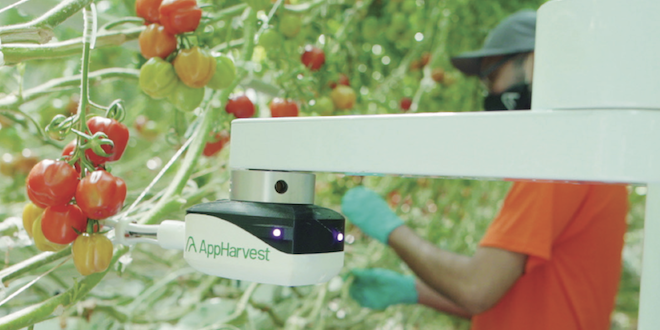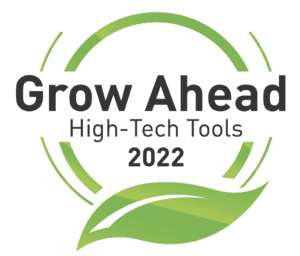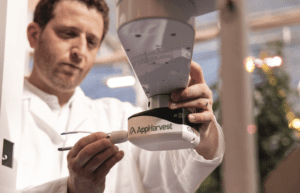

Jan 15, 2022AppHarvest grows indoors for tomatoes, other produce
The first tomatoes from AppHarvest’s flagship, 60-acre greenhouse in Morehead, Kentucky, first appeared on retail shelves in January 2021, but that pales in comparison to what the company hopes to be shipping out by the end of 2022.
Three additional greenhouses are under construction in the state. A twin greenhouse in Richmond, Kentucky, will double the company’s acreage for tomatoes. A 15-acre greenhouse in Berea will grow leafy greens. A 30-acre greenhouse in Somerset is meant to grow strawberries.


Despite that increase in produce production, CEO Jonathan Webb said the company hopes to work with, rather than against, other U.S. fruit and vegetable growers. He intends to invite other growers as well as breeders of new produce varieties, to the facilities in the future.
“I love to always try different tastes and flavor profiles and to see what growers are doing around the country, and hopefully as COVID starts to calm down, we can start to invite some of those vegetable growers to Kentucky with us, show them what we’re doing, and also learn from them and see what they’re doing. But we’re always trying to work together and see how we’re going to grow these numbers.”
Working together
In an interview with Vegetable Growers News, Webb said he doesn’t mean to compete with others in the market. He believes it’s possible to grow consumer demand for fruits and vegetables substantially – double it, even triple it.
“One in 10 Americans eats enough fruits and vegetables. This isn’t about competing with other vegetable growers; it’s about how do we grow the fruit and vegetable market to where people are eating good healthy food and have healthy fresh food options. It’s pretty remarkable to think that if three in 10 Americans ate enough fruits and vegetables, that the fruit and vegetable market would triple in the U.S.
“Let’s quadruple the U.S. market for fruits and vegetables,” he continued. “There hasn’t really been a ‘Got Milk?’ campaign (for produce), and we’re in 2021,” he said, referring to the dairy industry’s successful, decades-long national marketing effort started by California dairies.
AppHarvest recently took a stab at a consumer campaign of its own, Fight the Food Fight, or FTFF. The consumer-facing campaign coincided with the launch of an e-commerce website shop, appharvest.com, that sold salsas made from its tomatoes.
“We realize that really making a change in this space is gonna require a consumer movement, and a consumer movement is going to start with education, so for us, FTFF is a platform for us to go out and to start having those conversations,” said AppHarvest spokesman Travis Parman. “We started with a food truck and a mobile greenhouse so that we can show people what hydroponic hi-tech growing is all about.” They urged consumers to be discriminating about produce brands and to “be voting with your dollars” for domestically-grown, high-quality produce.
As for working with other growers, the company already has a start in such collaborations. In August 2021, AppHarvest and Mastronardi Produce Ltd. signed a non-binding letter of intent to form a joint venture, called FarmCo, to expand the supply of fruits and vegetables including leafy greens to Mastronardi’s existing fresh produce marketing and distribution.
“We were fortunate here that Paul Mastronardi believed in the mission of the company very early on and his team at Mastronardi flew down the content of many occasions in a very early process when this was just a concept, and we’ve been very excited to work with them to get our fresh produce out into store of shelves and on to American plates. We think this industry is stronger together.”


Growing for tomorrow
The flagship greenhouse hydroponically grows tomatoes not only with automation in basic greenhouse functions such as lighting, but with an eye toward harvesting as well. Webb said AppHarvest worked closely with the Dutch and many partners in the Netherlands to help execute its strategy in Kentucky. Also, AppHarvest in April 2021 acquired Root AI, and with it came a robotic harvester, Virgo, that can be configured to pick different crops such as tomatoes, peppers, cucumbers and, the company has stated, even more delicate fruits such as strawberries. And while full automation has yet to arrive on a commercial scale, Webb said it’s in the near future rather than decades away. Taken as a whole, the large greenhouse is already at a high level of automation.
“Our chief technology officer (and Root AI co-founder), Josh Lessing, likes to describe the greenhouse as a 60-acre robot because it’s so highly automated,” Webb said.
Talented staff are building out the company. In July 2021, the company announced the hire of Mark Keller, a veteran of Amazon. He now serves as the company’s senior vice president, software applications platform.
“Mark’s built stuff in two months here at AppHarvest that the industry hasn’t seen built in the last 20 years,” Webb said. “We have been very encouraged by the progress we’ve seen with the technology team and it’s really just getting the brilliant minds from around the world to sign up to go tackle this effort.”
It’s an ambitious company, and 2022 is set to be a busy one for the operation.
“We’re excited to not only be a large grower of tomatoes, but, by the end of next year, be a large grower of many different types of fruits and vegetables that will be on store shelves,” Webb said. “And hopefully, be a team player with the larger industry to try to grow the overall market and just get people eating more healthy fresh food options, and get those options into people’s homes. (In 2022), for us, we feel like we’re going to be one step closer to what the real full version of what AppHarvest looks like, which is, we’re more than a tomato company.”
— Stephen Kloosterman, associate editor; Photo at top: In Spring 2021 AppHarverst acquired Root AI and its robotic universal harvester, Virgo. Though Virgo can work indoors or out, the robot’s focus has been on controlled environment agriculture. Over several years, Virgo has collected a large data set of tomato images that help it identify varieties and decide when to harvest. Photo: AppHarvest














